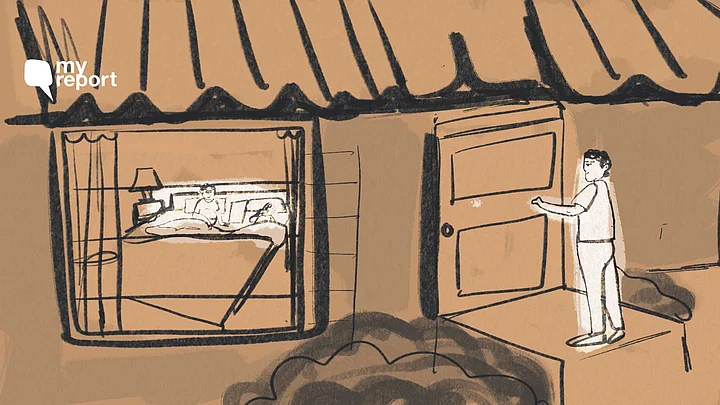Naresh was a 'focus volunteer' assigned to our home in Chennai when my wife and I tested COVID-19 positive during the second wave of coronavirus.
In the 15 days we were in isolation, he would climb up to our doorstep daily, hand over two boxes of lunch picked up from my mother who lives on the next street, enquire about our health and ask if we require anything else. Finally, before leaving, he'd give us a thumbs up and brighten us up with the most genuine smile I have ever seen (it is obvious because even under the mask, his eyes would crinkle).
As our quarantine came to a close and the government poster slapped on the face of our house was torn away, and importantly, as I felt myself coming back to (the old) normal, I decided to invite Naresh home and have a chat.
Modest or shy – you cannot guess. He sat at the edge of the sofa and answered all my curious questions with economic use of words and gestures, never once adjusting his mask.
He would earlier manage transportation at an IT firm. As COVID snatched away his job, he saw suffering all around him, and decided to take the plunge when one of his friends suggested the government's volunteer programme. While he did not get back his job, he has now joined Jio Fiber in their sales department. During the second wave, he looked after 40 families per day.
Weren't you afraid of working amidst sick people?
I was afraid initially. Soon, simply by following safety measures and taking precautions, I could see the positive impact my job had. That encouraged me to continue.
What about your family?
I have elders staying with me. They were very concerned when I first informed them. Now they have adjusted to the idea.
Over time, he himself got accustomed to the routine and did not develop any stress despite not having even a day off when he was volunteering. Reading stories and poetry after work brought him solace.
Naresh's Day During the Second Wave
Naresh and fellow volunteers would start work at 7 am with a brief meeting, following which they would drive to the 10 streets that were assigned to each.
They then were to visit each COVID-positive house, enquire about the patients' well-being, and leave with a smile. I cannot imagine how someone can smile so genuinely each time!
I was briefly reminded of my wedding reception when my wife Sruthi and I had to fake a smile for over four hours, hoping the camera wouldn't catch us while our cheeks ached.
Around midday, it was time to give a report to their manager, and back to visiting houses until 4 pm. Upon returning home, he told me, he would rush to the bathroom for a hot bath before meeting any family member.
That's all? Not exactly. He recalls that few patients would call him even in the night, asking if he could buy them this or that. He would oblige, though it was not a part of his job description.
There was hence, a lot of travel involved. He recalled a stretch of 14 days when he had to drive to T Nagar from Besant Nagar to get lunch for an old man who decided to trust only his daughter's cooking, and not order from restaurants nearby.
How did he manage the fuel expenses? From his own pocket, he told me casually. He had to make do with Rs 11,000 monthly salary paid to him by the government.
It was peak summer in Chennai the day Naresh visited. How did he run here and there in this weather, I wondered while wiping away a trickle of sweat from my forehead. He nodded away, as if to say I was making too much of a light matter.
When asked what refreshes him most, his answer was instantaneous. 'Manasala vazhtharanga,' he says, ie, blessings from the homes he visits.
This is not to say all were polite to him. "Some are rude," he mentioned that afternoon. "They ask me why I visit every day and disturb them when they are already sick."
When I asked him how he responds to such situations, he said he doesn't. He just smiles and walks away. I was surprised by how mature our thoughts could become by simply interacting with, and observing people around us. This reflects in his learnings from the volunteering experience:
"We must live together as one society, one family. We must at least respect, if not care for, the well-being of our neighbours, hawkers and every person we pass on our way. I see many COVID patients going for morning walks. I talk to them about pausing their routine for a while, but most brush me off."Naresh
Almost towards the end of our interaction, I asked if he witnessed anything crazy in all these months.
"I met one person who used to ask me to buy stuff for him. Every time I handed it over and left his flat, he would call me again for another item, and then say, "Ungalala mudiyum" (You can do it). I will never forget that!"
Boosting the morale of a passionate volunteer? Trust our people to amuse us even in their most dire situations!
It was time for Naresh to leave. He picked his bag, reminded us to drink hot water, and was almost off when I suddenly remembered... I reached for my camera, wondered how he should pose.
Well, that's easy!
(The author is the co-founder of storytelling startup Tellable. All 'My Report' branded stories are submitted by citizen journalists to The Quint. Though The Quint inquires into the claims/allegations from all parties before publishing, the report and the views expressed above are the citizen journalist's own. The Quint neither endorses, nor is responsible for the same.)
(At The Quint, we question everything. Play an active role in shaping our journalism by becoming a member today.)
